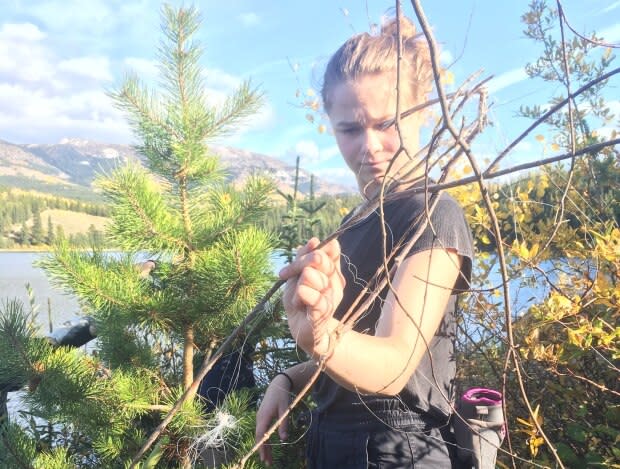It's unreel: Students tackle fishing line pollution in Whitehorse lakes
When Sarah Charlton and some fellow students went looking for lost or discarded fishing line at some Whitehorse lakes, they weren't sure how much they'd find.
They gave themselves 20 minutes at each of two popular fishing lakes, to get a rough measure of what they were dealing with.
"It was kind of crazy," Charlton said. "At first, you kind of look around, you don't see much — but once you start finding it, it is everywhere. And there's huge bundles of it.
"It was hard to leave after 20 minutes, because there's so much more."
Max Zimmerman, another one of the students, said it was "a shocking amount."
The group of four students from F.H. Collins Secondary School came up with the idea for something called the "Three Percent Project," a national program that offers mentorship to students tackling local issues.

The fishing line idea originated with Zimmerman's dad, Dennis, who's an environmental consultant. He calls lost or discarded fishing line "a silent killer."
"It deeply impacted me, many years ago, when I saw this northern harrier hawk all tangled up, and that died," Dennis Zimmerman said.
"It really did inspire me to kind of want to do more cleanups."
Max Zimmerman and his friends at the school's social justice club decided to run with the idea. The Three Percent Project teamed them up with a mentor, and Dennis Zimmerman is also helping out.
"I think it's a really cool, practical, hands-on, Yukon-focused project that can really help fish and wildlife — because they are getting tangled up and killed out there," Dennis said.
Looking for solutions
The project is still taking shape. Visiting a couple of lakes was just the first step — now, the students are looking for possible solutions.
"Part of the project would be to inform people, so we're hoping if we could make signs that told how to properly dispose of [fishing line], and what the harm that it causes is," said Charlton.

Another possibility is to install special receptacles at popular fishing lakes, to collect unwanted line. They plan to build a prototype, and look for other local organizations to get involved.
"People can put it in [the receptacles] if they don't want to bring it home and dispose of it themselves. So, it's really just to inform people and to reduce the amount that ends up in the environment," said Charlton.
Any line collected in the receptacles could later be cut up, or possibly recycled. The students might even use it for an art project.
"We're still brainstorming on that," said Max Zimmerman.


